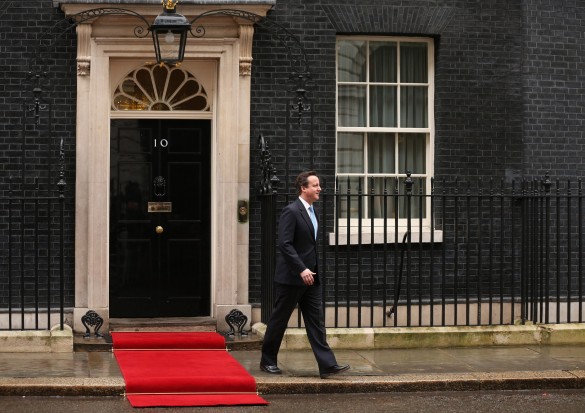The idea that ‘loyalty is the Conservative party’s secret weapon’ was always dubious. Benjamin Disraeli, for instance, made his name attacking a sitting Conservative prime minister. This, though, did not stop him becoming arguably the party’s most celebrated leader. But in recent years, the ‘loyalty’ adage has become a joke — one that has taunted leader after leader as they struggled to deal with an increasingly rebellious party.
The party changed leaders four times in the eight years between 1997 and 2005. In these opposition ‘wilderness’ years, changing a leader was the closest to power that Conservative MPs came. Leadership plotting gave an odd sense of purpose to their presence at Westminster.
In this period, few Conservatives could claim that they were blameless: few had been loyal to every leader. Those who had been complicit in the toppling of Margaret Thatcher, a three-time election winner, could hardly preach. But the situation became even more complicated when a Maastricht rebel became leader in 2001. Iain Duncan Smith’s ascent so offended some former whips, normally the guardians of party discipline, that they started to plot against him almost on principle: as a former rebel, they argued Duncan Smith was not owed loyalty.
At the turn of this year, David Cameron was in danger of becoming the latest leader to fall victim to the mutinous nature of the Conservative tribe. His backbenchers were becoming ever more obstreperous and a section of the party was becoming intoxicated by talk of leadership challenges.
First, there was the bizarre Adam Afriyie plot. This never concerned those closest to Cameron much. They viewed the idea of Afriyie as leader as simply too preposterous to catch on and predicted that he wouldn’t survive a serious TV interview. They were right; his encounter with Andrew Neil put a probably irreparable dent in his ambitions.
Then it was Theresa May’s turn. After the Home Secretary made right-wingers swoon with a wide-ranging speech about what the Conservatives should do to win the next election, some of the Cameroons looked unsettled. One took to complaining viciously about the ‘Mayniacs’ around her.
That all seems a long time ago. The death of Margaret Thatcher has brought the parliamentary party together again. One MP remarks: ‘It has reminded us of what we reap when we get rid of a leader.’ But Cameron has also taken the chance to show his MPs that he is one of them.
This is something that Cameron has been surprisingly bad at doing. Unlike Thatcher, he doesn’t, as a rule, write notes to colleagues complimenting them on their speeches. He is not a natural backslapper. One backbencher complains, ‘he’s not good at touching people’. He is also awful at realising that people remember every conversation they have with the leader. Chance encounters with his MPs might not mean much to him, but they mean an awful lot to those lower down the food chain which makes his sometimes off-hand manner particularly problematic.
Cameron, though, has gone against type these past few weeks. Every Conservative MP who spoke in the Thatcher debate has received a handwritten note from the Prime Minister thanking them for their contribution. The night of that debate he led a group of Conservative MPs to a Commons bar for a pint. Even those Conservative MPs who are normally critical of him concede that Cameron has had — as one of them says — ‘a very good couple of weeks’. In No. 10, they hope that this marks a turning-point in Cameron’s relationship with his MPs. One says, ‘Rome wasn’t built in a day. But for the first time, I think, we have a proper, systematic way of engaging with the party.’ Conservative MPs are crediting John Hayes, the garrulous minister who has recently started in No. 10 as a senior parliamentary adviser, with Cameron’s greater attentiveness to his party’s feelings.
One other thing cheering Conservative MPs is the presence of Lynton Crosby at the top table. To those who worry that the leadership is too metropolitan and doesn’t understand the grittier issues, the tough Australian is immensely reassuring. It has given some of those who had despaired of Cameron, a chance to clamber back on board.
But there are already doubts about how long this mood of unity can last. As one ministerial bag-carrier says, ‘The question is, are we like one of those families that come together for Christmas, only to drift apart again straight after?’ The first test will be the county council elections in May. The Conservatives are braced for loses, the last time these seats were contested was in 2009, when they were comfortably ahead in the polls. But their MPs are hopeful that the results won’t be as bad as feared. One source remarks, ‘The results won’t be great. But if our lot keep their nerve, it’ll be a one-day story.’
But if they don’t hold their nerve, the Conservatives will be plunged back to where they were before. This would be a double disaster for them because Labour unity has been built, in large part, on Tory disunity. The Labour party has been kept together by a sense that they are heading back to power. If a united Conservative party continues to narrow the poll gap, more and more Labour MPs will begin to air their concerns about Labour’s direction of travel.
Labour is also reaping the consequences of ejecting its own three-time election winner. The Blairites are no longer as tightly organised as they once were. But they are becoming more bitter about Blair’s ejection from office, not less, and more prepared to speak their minds. Ed Miliband’s regular distancing of himself from some of New Labour’s signature policies is particularly galling to them.
The next election is only two years away. If the Conservatives have rediscovered their secret weapon, then victory could be theirs. But if they have not, then they are in for another period of rapid leadership changes.







Comments